
How Long is Grated Parmesan Cheese Good For After Opening?
As a cheese enthusiast with an affinity for culinary adventures, I find myself indulging in the delectable flavors of grated Parmesan cheese quite frequently. However, I’ve often pondered the question, “How long is this grated Parmesan cheese good for once I open the package?” To unravel this mystery and provide you with the answers you seek, I’ve embarked on a comprehensive investigation, delving into the depths of culinary knowledge and expert insights.
Whether it’s sprinkled atop a steaming bowl of pasta or shaved over a gourmet pizza, Parmesan cheese adds an undeniable richness and umami depth to dishes worldwide. Understanding its proper storage and longevity is crucial to ensure optimal flavor and prevent spoilage. Let’s dive right into the specifics.
Refrigerated Grated Parmesan Cheese: An Extended Shelf Life
Once you’ve opened a package of grated Parmesan cheese, it’s best to store it in an airtight container in the refrigerator. Under these ideal conditions, it will retain its freshness and flavor for approximately six months. The cool, humid environment of the refrigerator inhibits the growth of bacteria and other microorganisms that can cause spoilage. However, it’s important to note that the shelf life may vary depending on the brand and type of cheese used.
Parmesan cheese is made from cow’s milk and undergoes an aging process that gives it its distinctive hard texture and nutty flavor. The aging process also contributes to its longer shelf life, as the enzymes involved in the aging process break down the proteins and fats, making the cheese less susceptible to spoilage. The grated form of Parmesan cheese has a larger surface area, which allows it to absorb moisture and potentially spoil more quickly than a block of cheese. However, refrigeration slows down this process significantly.
Recognizing Signs of Spoilage
Despite careful storage, there’s always a chance that grated Parmesan cheese can go bad. If you notice any of the following signs, it’s best to discard the cheese immediately:
- Mold growth: The presence of mold is a clear indication that the cheese has spoiled. Mold can appear in various colors, including white, green, blue, or black.
- Slimy texture: If the cheese develops a slimy or sticky texture, it’s a sign of bacterial contamination.
- Off-odor: A sour or rancid smell is a red flag that the cheese has gone bad.
Consuming spoiled cheese can lead to foodborne illnesses, so it’s important to be vigilant and discard any cheese that shows signs of spoilage.
Tips for Preserving Grated Parmesan Cheese
To maximize the shelf life of your grated Parmesan cheese, follow these expert tips:
- Use an airtight container: Store the cheese in an airtight container to prevent moisture loss and exposure to air, which can hasten spoilage.
- Avoid freezing: Freezing grated Parmesan cheese is not recommended, as it can alter its texture and flavor.
- Grate only what you need: Instead of grating an entire block of cheese at once, grate only the amount you need for immediate use. This helps preserve the remaining cheese and prevents unnecessary exposure to air.
FAQs: Addressing Common Concerns
Q: Is it safe to eat Parmesan cheese that has been refrigerated for a long time?
A: Yes, refrigerated Parmesan cheese can be safe to eat for up to six months. However, it’s important to check for signs of spoilage before consuming it.
Conclusion
In the world of cheese, Parmesan reigns supreme, adding a touch of culinary magic to countless dishes. Understanding how long grated Parmesan cheese is good for after opening is essential for ensuring food safety and enjoying its full flavor potential. By following the storage tips and expert advice outlined above, you can savor the delights of this gourmet cheese for an extended period, elevating your culinary creations to new heights.
Are you a fellow cheese enthusiast eager to explore the nuances of various cheese varieties? Be sure to check out our blog for more captivating articles that delve into the world of cheese and its culinary wonders.